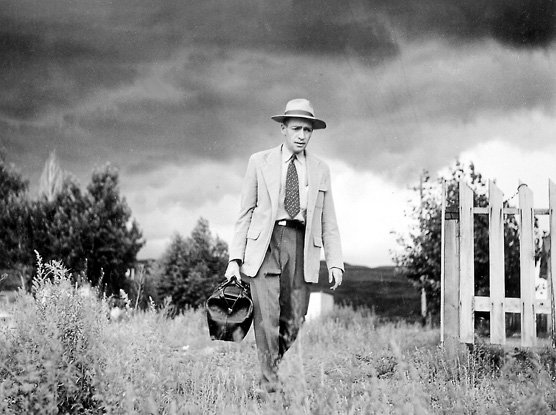
Clouds
Behind a steering wheel, radio tuned to WGPR—“GPR, God’s Precious Radiations” is what I think I heard one deejay say. It’s a Detroit station, terrific gospel on Sundays, and the Reverend Dr. Dre’s “radio ministry.” He’s offering up, because it is “Couple’s Day,” weekend overnights at the Marriott in Southfield—he pronounces it Souf’field. He talks about a couple he knows—he’s “fifty and somebody-odd years old” and she likewise and they all crazy like kids, the usual high-hog sermonizing. I quit listening. I’m thinking about “somebody” as an intensifier, what it does for the rhythm, throws down a little cluster of vocables to make “odd” more pronounced.
Lately I’m reading a lot of fiction—particularly “just” lately Daniel Woodrell’s Ozark novels, Chandler in a pickup truck—and all because I ask for no more some days than rapturous sentences. (And the “post-avant” poetry league of late suffers a want of rapturous sentences.) It’s rhythm that drives the sentence, pure and simple. Pure rhythm. (See how I double pumped that one there—for oomph and majesty.) Between the shard-masters—syntactical cut-ups and fragment-splayers, with that Tinseltown approach to the poem—and the New Sentencers (who attend more to the gaps between sentence than the sentences propres, strewing out a series of solitary clunkers in the wake of a theory-ship), they ain’t no mess of rapture to find late-ways in Poetryland, no?
So, in search of sentences: fiction with its mock-orality (I gots to hear it). Or talk, interviews (note: danger of exoticism, the novelty of the lingo “carrying” the sentence—as opposed to sheer rhythm). Exempla:
John Lee Hooker (b. 22 August 1917):
Why that I have such a big soul when I start singin’ the blues, spirituals, anythin’, is because I was normally a spiritual singer. I reversed from spirituals to the blues and when I get that big feelin’ look like it’s somethin’ like a bombshell hit me. You know, you can turn it right around’. The spirituals and the blues is based on just about the same pattern.William H. Gass (b. 30 July 1924):
Way back before you and everybody else and all the peoples was born, spirituals was the thing. Nobody can reach way back and find out just when it was born, but when spirituals was born it was born on the blues side.
There’s a lot of things that give you the blues, that give me the blues, that give any man the blues: it’s somewhere down the line that you have been hurt some place. I mean it’s no certain type of hurtin’ but you have been hurt some place and you get to playin’ the blues that reaches. And so that’s why when I sing the blues I sing it with the big feelin’. I really means it.
You can hear a certain type of record be playin’. You can be feelin’ very normal, nothin’ on your mind, period. But it’s somethin’ on that record hits you. It hits somethin’ that have happened in your life, and sometime if you can’t stand to listen to the record you take a walk or take a ride or get in your car because you don’t want to be hurt so deep that it cause heartaches and things. Because you’d rather not to hear it than to hear it. Because there’s some place in them records, there’s somethin’ sad in there that give you the blues; somethin’ that reach back in your life or in some friend’s life of yours, or that make you think of what have happened today and it is so true, that if it didn’t happen to you, you still got a strong idea—you know those things is goin’ on. So this is very touchable, and that develops into the blues.
(Interviewed by Paul Oliver in 1960.)
He had his hat. To rise? To doff one final time? good day, Madame—goodby—surprise— . . . to leave? He could do that. Run under it out of the rain. How many of his dreams had flight and freedom in them? Ham and eggs. Pie and cheese. Muff and sniff. She’d hear the Southern slurs of melting custard and be . . . entranced. He had his hat. He could do that. But noises he made deliberately to set her off, stomps around the room or weights he placed on the floor to make it groan, soda he shook and swallowed, screws he gave an extra turn to, fists he left printed in the air, the pounding he gave the coverlet, or conversely the squeaks he silenced with sewing machine oil, the har har hars he swaddled in socks, the lids he glued or the many things he simply removed in the trunk of their car to cast on the dump or drop in a lake or bury: none of these acts move her because, she said, under torture matter could be made to say anything. Mud, mold, matter—what one called it didn’t count—but it had neither courage, nor loyalty, nor conscience. In her husband’s police state matter would moisten its tongue for its own ass, and she didn’t believe that was right, she refused absolutely to consider it, matter alone meant nothing, a calf of slime, she said, not an object of experience, of piety or speech; it was a convenient carrier at best, a carton for cats, and so she thought of it the way typhoid must have thought of Mary, no more, not even as a necessary ambience or elevation or so much as a stand for music, pediment for a statue or tower with an aerial, though that was closer, and what was he, then, in his dense maleness, a series of surfaces like a stack of plates, what was he with his bowling and his beer and his business—charging the living for their life and paying off only when death was a winner—what was he with his busy pencil and greedy teeth, in the flesh of his flesh, but the purest muck, individuation driven to the point of indifference, asafetida not energy, sheer dumb disagreeable stuff, unworked, unrealized, raw, foolish in its lean and teeter, its oils, wows. and ouches, as an Evereadied dolly, yet with a prick which led him on his little trot though life like a leash held at the loop end in the Pope’s fist? Butterflies leave laces in the air like a courtier’s cuffs, she said. Faugh. Easy to say such, harder to prove so.—
“Cartesian Sonata,” out of Cartesian Sonata and Other Novellas
Lists are juxtapositions, and exhibit many of the qualities of collage. The names which appear on them lack their normal syntactical companions. Most lists are terse, minimal, bald; they are reminders, commands, aspirations. We do not trouble to write: one medium head of nice fresh red Boston lettuce, two large slicing tomatoes if ripe, a small bottle of Dr. Bland’s salad dressing but only if it’s in that cute chef-shaped bottle . . .
“I’ve Got a Little List,” out of Tests of Time
Vying amongst treetops and other earthbound debris in an attempt to photograph the skies, I think of a story a bookseller named Garvin handed along. Common breed of windbag used-book dealer, opinion-plagued, borne up astride an oceanic font of “useless and pointless knowledge.” He related how one photographer—W. Eugene Smith is who I recall—up on a house ladder for a shoot of something or other, could see exactly the angle needed for the shot, out there, in mid-air. So, with camera, he jumped, fired the shutter, got the snap, and fell, fracturing a leg in the fall.

W. Eugene Smith, Country Doctor, 1948
The way fireflies seem to ascend up out of lawns at dusk, tailing light up to the still barely light-lit heavens.